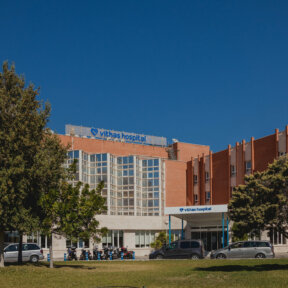What is geriatrics?
Geriatrics is a medical speciality dedicated to the study of the prevention, diagnosis, treatment and rehabilitation of diseases in the elderly.
Geriatrics solves the health problems of the elderly from the perspective of prevention of physical and mental disabilities, medical treatment and rehabilitation and integration into their environment.
The specific purposes of this speciality are:
- To develop a care system at all levels, which addresses the multiple alterations and medical-social problems of the elderly, which often acutely and subacutely involve the loss of their physical or social independence.
- To mobilise all resources to integrate as many elderly people as possible into the community.
- To provide prolonged care for the elderly in need.
- To promote the research, teaching and continuous training of its own specialists and the staff recruited for this speciality.
Geriatricians are medical specialists who normally practise in hospitals, in people’s homes or in nursing homes, caring directly for patients. They care for patients in hospital wards (bedridden patients), in outpatient consulting rooms (intra or extra-hospital), and in A&E departments.
Which patients is it for?
A geriatric patient is defined as one who meets the following conditions:
- Generally over 75 years of age
- Relevant pluripathology and chronic disease control
- Uses multiple and different drugs (polypharmacy)
- High risk of dependency
- Has accompanying or predominant mental symptoms
- Has social problems linked to their health status
- Evidence of fragility
Its main goal is the functional recovery of the sick and incapacitated elderly to achieve the highest possible level of autonomy and independence, thus facilitating their reintegration into a self-sufficient life in their home and habitual environment.
Main conditions and diseases
- Diseases and conditions in the elderly
- Arthritis and osteoarthritis
- Mental illness
- Osteoporosis
- Diabetes
- Eating disturbances in the elderly
- Flu and pneumonia in the elderly
- Heart disease
- Sleep disorders
- Parkinson’s disease
- Alzheimer’s/senile dementia
Main diagnostic resources and technology
Geriatric assessment is a multidimensional process designed to assess functional ability, health (physical, cognitive and mental) and socio-environmental status.
- Functional ability: The patient’s ability to accomplish activities of daily living should be assessed.
- Physical health: Anamnesis and physical examination should assess the most frequent problems of the elderly. The physical examination consists of
- Inspection (looking at the body).
- Palpation (feeling the body with the fingers or hands).
- Auscultation (listening to sounds).
- Percussion (producing sounds, usually by tapping specific areas of the body).
- Intelligence and mental health: Examining mental status and Hamilton depression scale.
- Socio-environmental situation: The patient’s network of social interactions, available social support resources, special needs and safety should be defined.
Areas of specialisation
- Orthogeriatric Clinic: specially intended for patients who have suffered a hip fracture and discharge is prescribed as the only face-to-face consultation after this process, with non-face-to-face assessment by the traumatology unit.
- Cardiogeriatric Clinic: specially intended for patients proposed for PAVI or another process that cardiology deems necessary prior assessment by Geriatrics.
- Oncogeriatric Clinic: specially intended for patients with haemato-onological processes who are going to receive onco-specific treatment or for whom this option is being evaluated.
- Geriatric Nursing Clinic: specially designed for patients who are going to go to the Orthogeriatric Clinic and/or General Geriatrics Clinic.
Special services
This is a care system at all levels, which addresses the multiple alterations and medical problems of the elderly, which often acutely and subacutely involve the loss of their physical or social independence.
Why come to our clinic?
Understanding the specific needs of this age with its associated conditions and limitations makes it easier to understand and improve our patients’ lives.
- Cutting-edge treatment
- Technology
- Personalised care
FAQs
What does the concept of life expectancy mean?
Life expectancy is defined as the average number of years lived, in practice, from birth or from a specific age.
What is active and healthy ageing?
According to the WHO, healthy ageing is the “process of developing and maintaining the functional ability that enables well-being in older age”.
Active ageing is defined as the “process of optimising opportunities for health, participation and security in order to enhance quality of life as people age.” (WHO).
The pillars of active ageing are health, participation and security. The determining factors are economic, behavioural, personal, social, those related to health and social systems, and those related to the physical environment.





